
Vash had not stood in this chamber in many years. He had always come with his mother, and his mother had been dead for nearly a decade. Moreover, he remembered that he had been young enough to have wanted to hold her beloved hand, and so he thought it might have been fifteen years.
He saw the Shalla nearly every day, but meeting her here in her chamber was something else entirely. The fact that she had sent the ladies away made it all the more eerie. He could have winked at the ladies and made them smile, but the Shalla alone was nearly more than he could face. Or perhaps he only feared her reaction when he told her what he had come to say.

“It is permitted for this elf to approach the Shalla,” she said with the high formality she never laid aside, even outside this chamber.
Vash kneeled to kiss the toe of one of the slippers that lay before her. “May the earth rise up to meet you, Saralla.”

“May the rain fall softly upon your face, Vash. You are looking pale. It is torchlight you need.”
Vash bowed his head.
“It is the elf Dara who requested an audience for you. Why did your father not speak for you?”
“I have not told my father of this matter.”
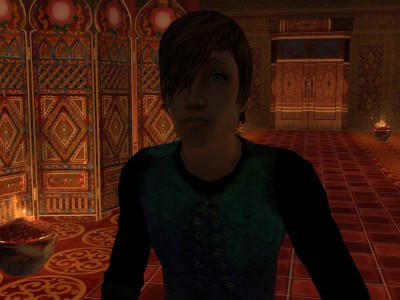
“It is grave enough for the Shalla but too grave for your father?”
“Only the Shalla might help me in this matter.”
“Then it is for your father to ask for you.”
“I know it.”
“You are a disobedient son.”
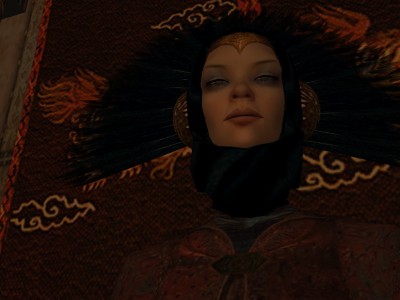
“I know it.”
“But you have grown up without your mother,” she sighed. “It is permitted for this elf to sit in the presence of the Shalla,” she said with a weary wave of her old hand.
Vash stepped away to a respectful distance and sat on the floor before her.
“It is permitted for this elf to speak of this grave matter,” she said.
“It concerns Iylaina.”
“So I expected.”
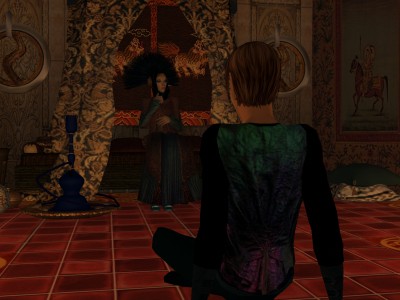
“She has been bound to a man in the ritual they call ‘marriage.’”
The Shalla was silent for a long moment. “It must be difficult for you to bear, Vash. You have my sympathy. But this ‘marriage’ is not binding.”
“I know it,” Vash said slowly. “But… she has also been bound to him by our rite.”
“Who has done this?” she gasped.
“She did it herself. They two alone. She and the man.”
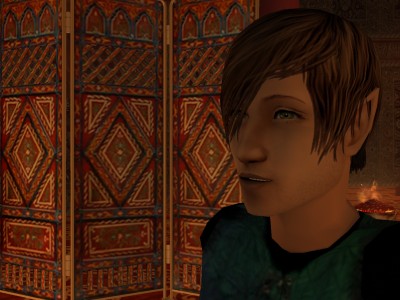
This time her long silence seemed to be meant to calm her fury. “How did she know of this rite?” she hissed.
“I told her.”
“You have spoken to Iylaina?”
“Yes.”
“It is forbidden.”
“I know it.”

“It is not merely a caprice of mine or of your father’s, Vash,” she scowled. “It is the instruction of the Bright Lady.”
“I know that better than anyone,” Vash muttered.
“And yet you told Iylaina how she might bind herself to this man.”
“No! I only told her how we were bound. What she did was her idea. I never dreamed she would try. It is unthinkable.”

“Why did you tell her this?”
Vash did not answer.
“Why did you speak to her?”
“I could not bear it,” he mumbled.
“Because the Vash-elf is more important than all the rest of us?” she asked, insulting him by speaking of him as if he were no more than kisór.
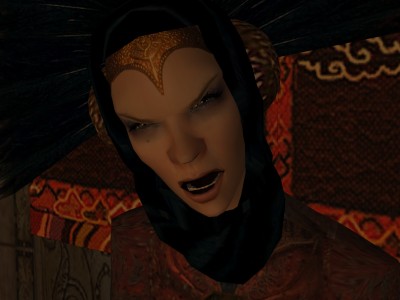
Vash was enraged. “No! It is unnatural! How can any elf be expected to endure what I have endured? How can you bind children, and then tell them they may not meet again until fifteen winters have passed them by? It is more than any elf could bear!”
“It is not fitting to speak in your own defense when your own acts condemn you,” she said coldly.
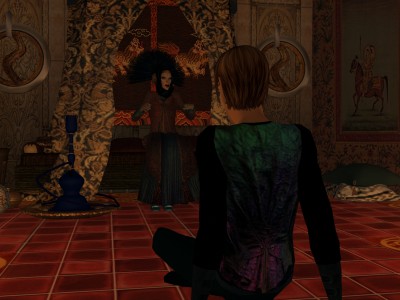
“I know it,” he muttered.
“What will become of us now, Vash?”
“I want to know what will become of me! What does this mean, what she did?”
“What did she do?”
“She cut their hands with a knife and mingled their blood. But they did not speak the ceremony,” he added hopefully. “They did not say the words.”

“Vash,” she said, and then she was silent. When she spoke again, she had taken up the archaic, formal language that was no longer in use except for poetry and ritual. “What is life?”
“Life is blood and the breath of the body,” he replied automatically, as he had learned in his childhood lessons.
“What did you not say?”
Vash hesitated. “What do you mean?”
“Is there life in words?”

“We do not say so.” When she did not speak further, he asked, “Do you say that they are bound?”
“I said nothing.”
“But how can it be? She was bound first to me. And is still.”
The Shalla said nothing.
“Can they be unbound?”

“Vash,” she said coldly, “you have forgotten everything you learned as child. If I pour water into milk, can you pour the water out again?”
“No.”
“Then what she has done can not be undone. If I speak into the air, can I breathe my words back in again?”
“No.”
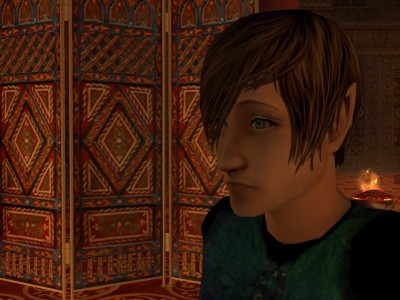
“Then what you have done can not be undone.”
“But how can it be? We are three!”
“Vash.”
“Yes, Saralla?”
“What is it called when two strands are bound together?”

“A knot,” he replied, though in his language it was, he knew, the same word for when two elves were bound together.
“What is it called when three strands are bound together?”
“I don’t know.”
“So the girls tell me,” she said with a wry half-smile. “It is called a braid.”
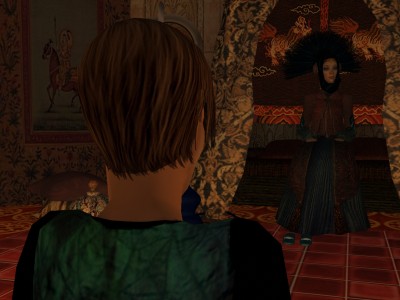
“But what does that mean?”
“I do not know. Ninety-seven winters have passed me by since I first opened my eyes onto the light, and I have never seen such a thing.”
“There is something else I must tell you, Saralla,” Vash murmured.

“It is permitted for this elf to speak of this other matter,” she sighed.
“Iylaina is with child,” he said, though he could manage no more than a whisper.
The Shalla had heard too much by this time to be shocked. “With this man’s child?”

“Of course.”
“Was it before or after she was bound to this man?”
“I don’t know,” he whimpered. “Does it matter?”
“I do not know.”
“What shall I do?” Vash sobbed.
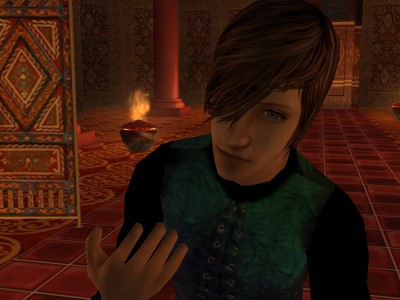
The old elf’s thin, high voice was softened slightly with compassion. “I do not know. You shall ask the Bright Lady on the occasion of the next full moon. She may not be able to tell you what will happen to you and Iylaina and this man and this child. But she may be able to tell you what will happen to the rest of us.”
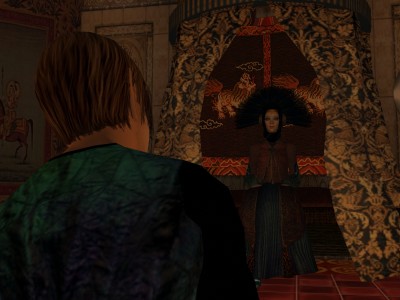






 I really didn’t think that Baby and Malcolm’s ceremony did anything for them; the idea that it actually worked didn’t even occur to me!
I really didn’t think that Baby and Malcolm’s ceremony did anything for them; the idea that it actually worked didn’t even occur to me!




Oh crap. I am really not liking this at all.